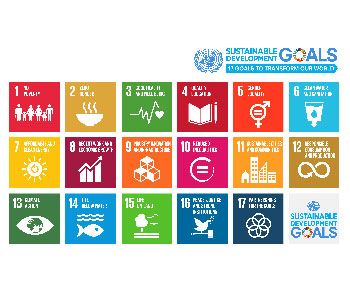
The relevance of the climate targets for viticulture
Back in 2015, the United Nations defined seventeen Climate Targets. These "Sustainable Development Goals" (SDGs) serve to globally secure sustainable development on an economic, social and ecological level. Only now are they slowly becoming more widely known in Austria. This is also thanks to "ESG", the corresponding approach of the financial world together with its classification system for sustainable economic activities called "EU taxonomy". The SGDs are universal and hold companies, organisations and private individuals equally accountable. And of course they also apply to the wine sector.
April 2022
What distinguishes the Sustainable Development Goals is their positive approach: What can I, what can my company contribute to achieving the climate goals? Since they are clearly defined with a timeframe, they seem feasible. At first glance, however, the 17 SDGs seem powerful and not intended for an SME. At second glance, there is a series of sub-goals behind them, the 169 targets. This is where we come closer to the matter.
Since we always set priorities in sustainability, only the most relevant SDGs are listed here. You start where you or your supply chain has the greatest impact on the environment, economy and society. In viticulture, these are mainly soil, packaging (wine bottles are responsible for up to 45% of all CO2 emissions), energy and team. All other areas along the supply chain and mindful of all stakeholders are to be considered and served step by step as well. And the taxonomy also comes into play: in future, sustainable projects and ventures will be promoted first and foremost. A vintner who builds a CO2-neutral or -negative warehouse is more likely to receive a loan than someone who does not think about sustainability.
SDG 6 Clean Water and Sanitation. Ensure availability and sustainable management of water and sanitation for all.
6.5 By 2030, implement integrated water resources management at all levels, including through transboundary cooperation as appropriate.
6.6 By 2020, protect and restore water-related ecosystems, including mountains, forests, wetlands, rivers, aquifers and lakes.
SDG 8 Decent work and economic growth. Promote sustained, inclusive and sustainable economic growth, full and productive employment and decent work for all.
8.5 By 2030, achieve full and productive employment and decent work for all women and men, including for young people and persons with disabilities, and equal pay for work of equal value.
8.8 Protect labour rights and promote safe and secure working environments for all workers, including migrant workers, in particular women migrants, and those in precarious employment.
SDG 12 Responsible Consumption and Production. Ensure sustainable consumption and production patterns.
12.2 By 2030, achieve the sustainable management and efficient use of natural resources.
12.4 By 2020, achieve the environmentally sound management of chemicals and all wastes throughout their life cycle, in accordance with agreed international frameworks, and significantly reduce their release to air, water and soil in order to minimize their adverse impacts on human health and the environment.
12.5 By 2030, substantially reduce waste generation through prevention, reduction, recycling and reuse.
SDG 15 Life on Land. Protect, restore and promote sustainable use of terrestrial ecosystems, sustainably manage forests, combat desertification, and halt and reverse land degradation and halt biodiversity loss
15.1 By 2020, ensure the conservation, restoration and sustainable use of terrestrial and inland freshwater ecosystems and their services, in particular forests, wetlands, mountains and drylands, in line with obligations under international agreements.
15.5 Take urgent and significant action to reduce the degradation of natural habitats, halt the loss of biodiversity and, by 2020, protect and prevent the extinction of threatened species.
15.9 By 2020, integrate ecosystem and biodiversity values into national and local planning, development processes, poverty reduction strategies and accounts




